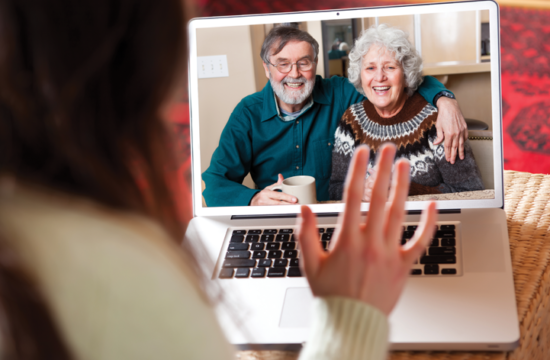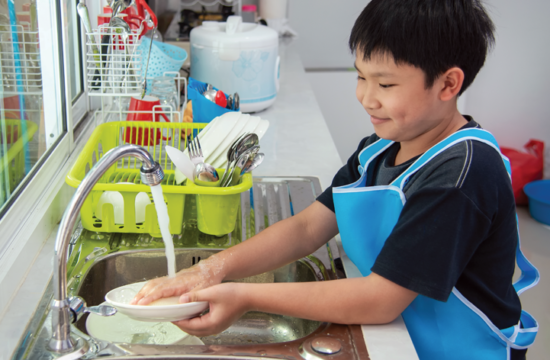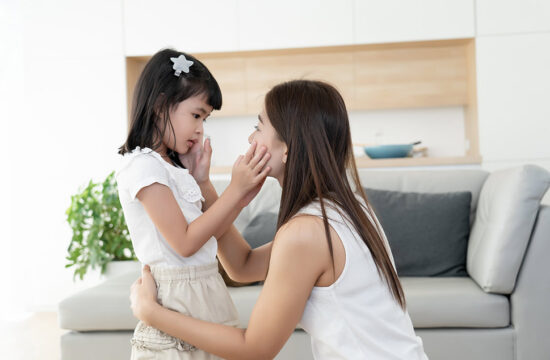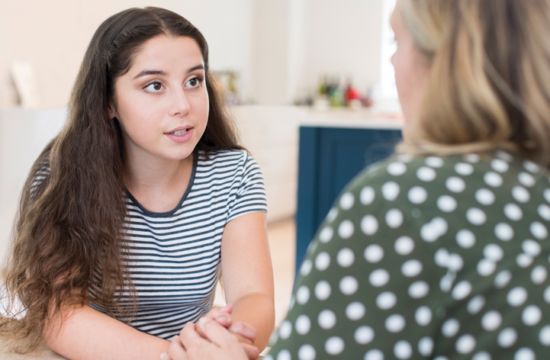As the world comes to grips with the ramifications of the coronavirus, anxiety, fear and uncertainty clutch many of our families, and our children. This is a hard time to be a parent, dealing with an unprecedented-in-our-lifetimes pandemic whose full impact we don’t yet comprehend. Local experts agree one of the most important things for parents to prioritize during any time of great uncertainty is our families’ mental health.
Follow these 10 tips to protect and stabilize your kids and yourselves:

Cultivate calm. How parents handle uncertainty and fear greatly impacts how children will handle them, too. First, be aware of your own reactions and take time alone or with other adults to process your feelings.
Our words, facial expressions, tones and language will send [our children] the message of how they should feel in their little bodies, Speak with grounding words, eliminate anxiety language and hold anxious expressions for behind closed doors.
Help your child feel calm by using a gentle voice, offering reassuring hugs and talking to them about what you are doing to keep them and others safe. Use understanding and supportive language, like “I’m here for you” and “How can I help?”
Create a calm-down or relaxing area in your home together. Include items like pillows, blankets, coloring books, books to read, fidget toys or stuffed animals.

Ask questions first. if your kids aren’t asking about the coronavirus it’s important to initiate conversations. Rather than providing information first, ask open-ended questions.
Let them tell you what they have heard and give ample opportunity to ask questions.
Instead of leading questions like “Are you scared about getting sick?” or “Are you worried?” try more general options that give you a pulse on their feelings, like “Tell me something that helped you feel happy (or made you feel sad, worried, etc.) today.

Be honest. Give your kids the facts, especially because they may have heard wildly inaccurate rumors, and explain the importance of getting information from trusted sources like county departments of health or the CDC. Give kids actionable tips on keeping your family healthy, like frequent hand washing, disinfecting often-touched surfaces and avoiding touching their faces.
There is a fine line between being cautious and preventative and inciting fear. Honesty is the best policy but it’s all in how you frame the information. For example, instead of explaining that you’re being cautious because you don’t want to risk grandparents getting so sick they have to go to the hospital, say you are helping to keep grandparents healthy because they are at a higher risk.
It’s important to explain necessary social distancing and quarantine with positive perspective, using words like help, protection and safety versus scared, panic and crisis.
When children do see or hear information about the pandemic, use that as an opportunity for conversation.

Acknowledge emotions. We are often taught to distract ourselves or our kids from our anxiety. Instead of telling your kids, or yourself, not to worry or that everything will be just fine, honor those feelings and try to understand them. To a degree, anxiety can benefit you and reveal positive character traits.
When kids’ questions or fears are silenced or aren’t honored, they tend to internalize their feelings and make up their own stories as answers, which can escalate their anxiety.
On the flip side, when parents share and acknowledge their own worries, in a developmentally-appropriate manner, the child is validated. This is a perfect opportunity to talk through helpful coping mechanisms together.
“Explain that mommy feels anxiety, too, sometimes, and when I am anxious I go for a walk,” Then ask: “Do you think that could help you? What works for you?”

Minimize media. It’s imperative to control the amount of information we’re all receiving through the news or social media.
Kids could have information at their fingertips they don’t quite understand.
When children do see or hear information about the pandemic, use that as an opportunity for conversation. Stress examples of what your family and others in the community are doing to keep people safe. For adults, it’s important to recognize when media consumption goes beyond being informed to overindulgence. When we are stuck in a cycle of fear, it is hard to remain calm, problem solve and focus on what is within our control.

Mindfulness matters. Mindfulness means slowing down to become aware of what you are feeling in your body. Practicing deep breathing, meditating, imagining yourself in your favorite place or squeezing play dough, a stress ball or stuffed animal can all help in this process.
Do journaling and drawing about what makes us feel anxious and what makes us feel better. These activities can help express emotions that are difficult to talk about, allowing kids to re-frame, process and release feelings. Other tips to calm an anxious child include taking a cold drink of water or naming a category of something alphabetically (like animals: alligator, bear, cat, etc.).
Ask or assess if your child is tired, hungry or thirsty. Make sure your child is staying hydrated, well rested and has regular meals and snacks (that goes for adults, too!)
Meeting a child’s basic needs can help prevent or calm an anxious child or a challenging behavior.
When a child feels worried or anxious, sticking to what they know can create a sense of calm in what they may feel is chaotic.

Move your body. Exercise is one of the most natural, and quickest, ways to reduce stress and anxiety. Family dance parties, kid-friendly yoga (Cosmic Kids yoga on YouTube) and jumping jacks are easy options to employ throughout the day.
Make sure kids have the opportunity to get outside and get fresh air.
Take a walk, go on a nature hunt, hop on bikes or create an outdoor obstacle course to let loose and have fun.

Establish routine. An extended period out of school and drastic changes in kids’ routines can lead to feelings of insecurity. Creating a routine, even if it’s different than usual, can help kids maintain a sense of normalcy and predictability.
Take time together to talk through your family’s current routine. Create a poster with a schedule kids can depend on with activities they can look forward to, even if you just include two or three items a day.
Rather than a rigid system, try a “rhythm” mentality, which can be flexible but also predictable for a child.
When a child feels worried or anxious, sticking to what they know can create a sense of calm in what they may feel is chaotic. Stick to regular mealtimes and bedtimes and other routines such as reading before bed.

Prioritize play. Big feelings often manifest themselves physically, like stomach or headaches, but kids don’t always have the insight or communication tools to convey those issues like adults do. Because of difficulty verbalizing feelings, opportunities to play together are critical. And adults need a break from the everyday, too.
If you join them through play, you’ll learn a lot about them and connect while doing it.
Take time to be silly, play games and create art. Prioritize simply being with one another.
They are more concerned about what is happening in their home than what’s happening in the world, Being fully present as much as possible will alleviate anxiety.

Get grateful. Cultivating gratitude is powerful for kids and adults alike, an opportunity to reduce stress and anxiety and keep things in perspective. Come up with something you are grateful for together every day.
You can make these a visual reminder and post them on a wall or window. Cut out hearts, use Post-it notes, use whatever you have and have fun with it!
Make space for hugs and infuse family time with positivity and perspective.
Embrace conversation filled with the ways this time will bring us closer as a family and provide space for us to try new things, create, rest, play, eat and explore the world from our homes together.
We’re not going to be perfect and neither are our kids. Offer grace (to yourself and your kids), ask for forgiveness and refocus on kindness and compassion as often as needed. Above all else, just keep talking.








